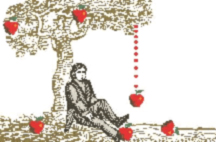About six months ago, Dave wrote a couple of articles on the topic of “grit.” We received a lot of feedback on this topic from our clients who are regular readers of WorkPuzzle. It seems to be a topic that intrigues many of us.
 Earlier this month, the topic also caught the attention of the Boston Globe. Jonah Lehrer wrote a lengthy Sunday morning feature on the topic. Over the next couple of days, I’m going to highlight a few ideas from Lehrer’s article to help us gain a better understanding of this important topic.
Earlier this month, the topic also caught the attention of the Boston Globe. Jonah Lehrer wrote a lengthy Sunday morning feature on the topic. Over the next couple of days, I’m going to highlight a few ideas from Lehrer’s article to help us gain a better understanding of this important topic.
“It’s the single most famous story of scientific discovery: In 1666, Isaac Newton was walking in his garden outside Cambridge, England – he was avoiding the city because of the plague – when he saw an apple fall from a tree. The fruit fell straight to the earth, as if tugged by an invisible force. (Subsequent versions of the story had the apple hitting Newton on the head.) This mundane observation led Newton to devise the concept of universal gravitation, which explained everything from the falling apple to the orbit of the moon.
There is something appealing about such narratives. They reduce the scientific process to a sudden epiphany: There is no sweat or toil, just a new idea, produced by a genius. Everybody knows that things fall – it took Newton to explain why.
Unfortunately, the story of the apple is almost certainly false; Voltaire probably made it up. Even if Newton started thinking about gravity in 1666, it took him years of painstaking work before he understood it. He filled entire vellum notebooks with his scribbles and spent weeks recording the exact movements of a pendulum. (It made, on average, 1,512 ticks per hour.) The discovery of gravity, in other words, wasn’t a flash of insight – it required decades of effort, which is one of the reasons Newton didn’t publish his theory until 1687, in the ‘Principia.’
Although biographers have long celebrated Newton’s intellect – he also pioneered calculus – it’s clear that his achievements aren’t solely a byproduct of his piercing intelligence. Newton also had an astonishing ability to persist in the face of obstacles, to stick with the same stubborn mystery – why did the apple fall, but the moon remain in the sky? – until he found the answer.”
Notice the time it took Newton to figure out the scientific Law of Gravity — 22 years! Was Newton willing to work hard? Of course he was. But, grit isn’t simply about a willingness to work hard. It’s about setting a specific long-term goal and doing whatever it takes until the goal has been reached. It’s always much easier to give up, but people with grit keep going, despite the hardships and obstacles they encounter.
If you’re a hiring manager, this is an important topic to consider when interviewing. Ask questions that help you learn if a person has displayed a Newtonian stick-to-itiveness in their past jobs or life experiences. These are the people who are most likely to display the same traits on your team.
If you have the responsibility for coaching those in your group, consider using Newton’s story in an upcoming coaching session. We all need inspiration to set goals and stick to them. When we see that the most successful people in history used this formula, it renews our resolve to follow the same path.

